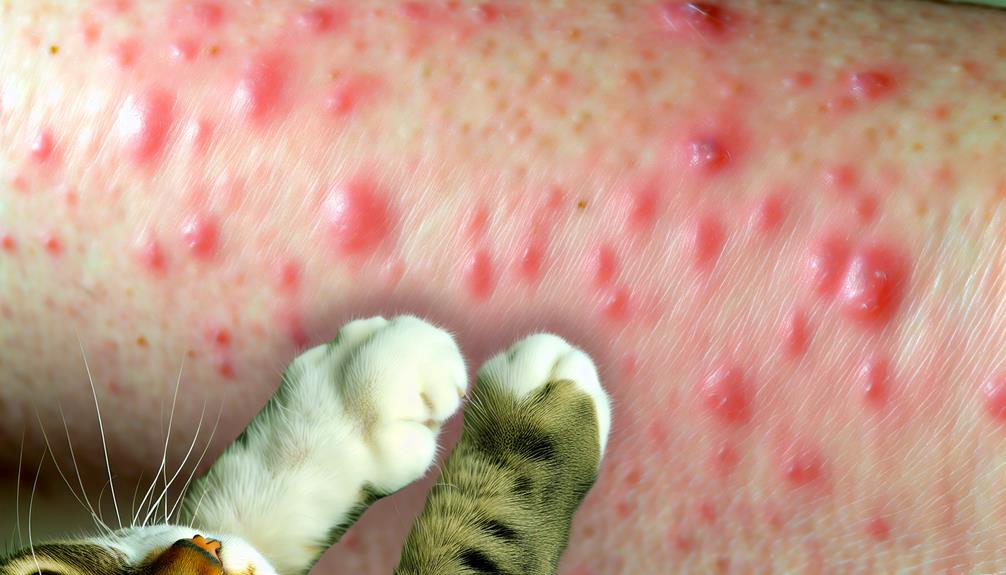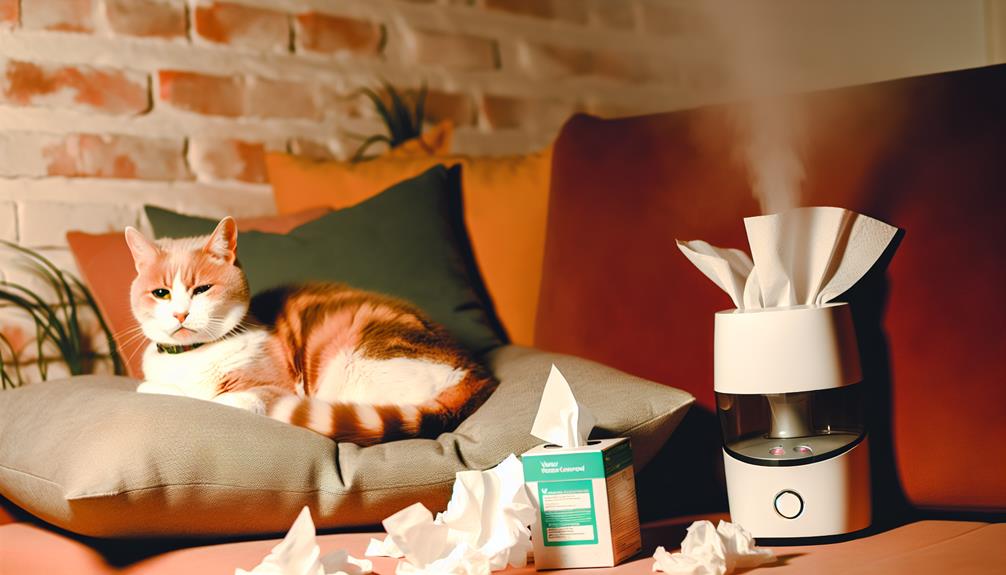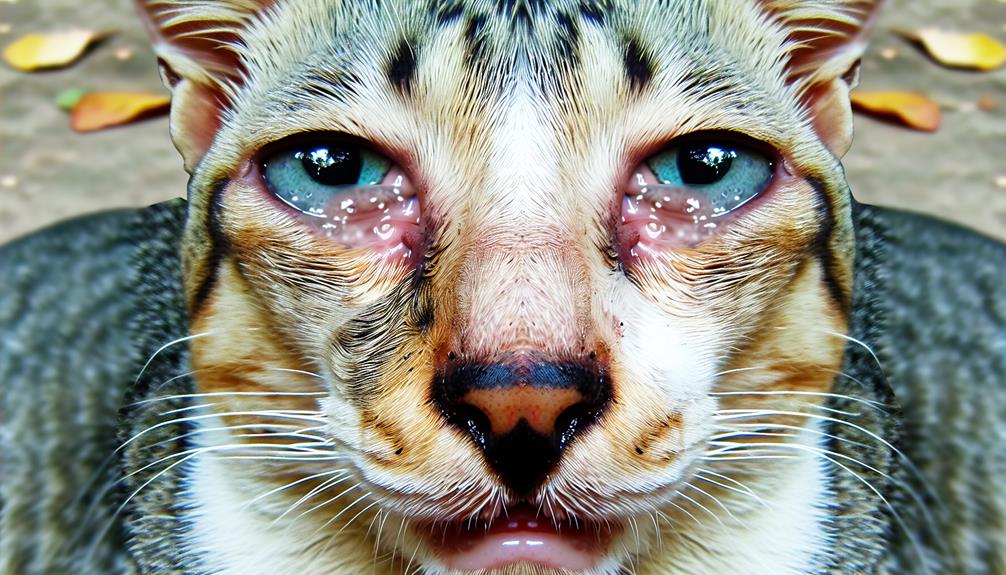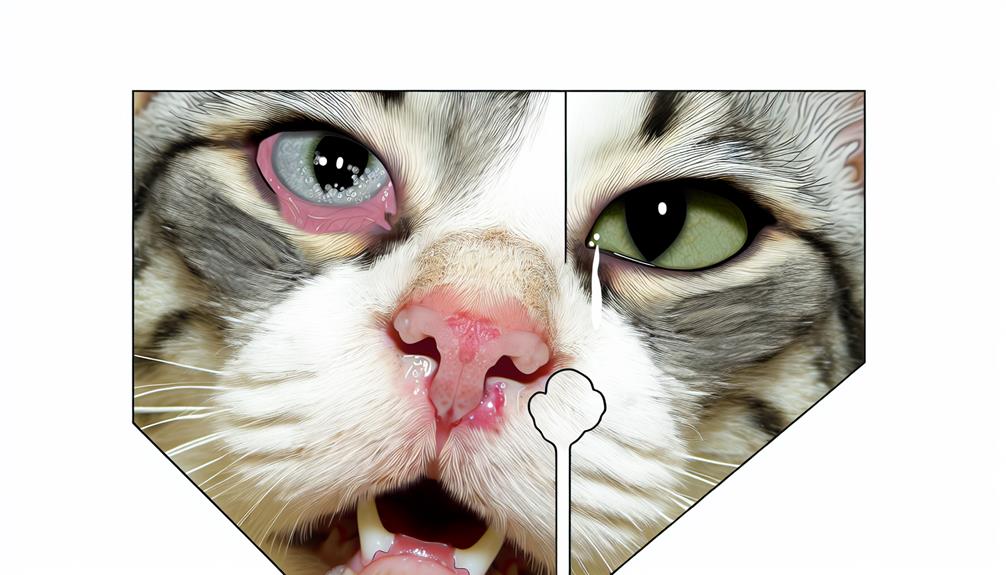Do you ever wonder why some people get itchy and sneezy around cats? Well, it all has to do with proteins found in cat saliva, urine, and dander. These proteins, called allergens, can cause our immune system to go into overdrive and give us those annoying symptoms. But why does this happen? It's actually quite fascinating! By understanding the science behind cat allergies and itching, we can learn how to better deal with these issues and make life easier for both humans and their feline friends. Let's dive in and uncover the secrets of cat allergies and itching!
Key Takeaways
Key Takeaways:
- Cat allergies and itching occur when our immune system reacts to certain proteins in cat saliva, urine, and dander.
- Symptoms include sneezing, wheezing, itchy eyes, and rashes.
- Doctors can diagnose cat allergies through skin or blood tests.
- To prevent cat allergies, try to avoid cats and keep your surroundings clean.
- Consult a healthcare professional for more information or assistance.
Causes of Cat Allergies and Itching
Why Do Cats Make Us Itch? Let's Find Out!
Have you ever wondered why some people get itchy around cats? Well, it turns out that there are a few reasons for this. Let's dive in and explore the causes of cat allergies and itching!
- Dander: Cats have tiny particles of skin called dander, which they shed regularly. These little particles contain allergens, like the Fel d 1 protein, that can trigger an allergic reaction in some people.
- Saliva: When cats groom themselves, they spread saliva on their fur. This saliva can dry up and become airborne, causing allergic reactions when we breathe it in.
- Urine: Believe it or not, cat urine can also cause allergies. The proteins in cat urine can irritate our skin or be inhaled as the urine dries, leading to allergic reactions.
Now that we know what causes cat allergies and itching, let's talk about how to deal with them!
- Minimize Exposure: If you or someone in your family has cat allergies, it's a good idea to keep cats out of certain areas of your home. Using air purifiers can also help remove allergens from the air. Regular cleaning and vacuuming can reduce the amount of cat dander floating around.
- Medications: There are medicines that can help manage allergy symptoms. Antihistamines can relieve itching and sneezing, while nasal corticosteroids can reduce inflammation in our nasal passages.
- Allergy Shots: In more severe cases, allergy shots may be recommended. These shots gradually desensitize our immune system to the allergens over time, reducing allergic reactions.
Symptoms and Signs of Cat Allergies and Itching
Cat Allergies: What Are the Signs and How Can You Stop the Itching?
Did you know that cat allergies are not caused by their hair? It's actually a protein in their saliva, urine, and dander that triggers allergic reactions. But what are the symptoms of cat allergies and how can you treat the itching? Let's find out!
Signs of Cat Allergies:
- Sneezing
- Coughing
- Wheezing
- Nasal congestion
- Itchy and watery eyes
- Skin rashes
- Itching
These symptoms can happen right away after being around cats or develop over time. It's important to remember that everyone's reaction can be different – some people may have more severe symptoms than others.
How to Manage Cat Allergies:
- Avoiding Contact: The best way to prevent allergic reactions is to stay away from cats. If you can't avoid them completely, try to limit your exposure.
- Keep it Clean: Regular cleaning and vacuuming can help remove allergens from your environment. This includes cat hair, dander, and any other particles that might cause a reaction.
- Over-the-Counter Relief: There are antihistamines and nasal sprays available without a prescription that can provide temporary relief from allergy symptoms. Just make sure to follow the instructions and consult with a doctor if needed.
- Allergy Shots: For more severe cases, your doctor may recommend allergen immunotherapy, also known as allergy shots. These shots help your immune system become less sensitive to cat allergens over time.
Remember, it's essential to talk to a healthcare professional if you suspect you have cat allergies. They can help diagnose your allergies and provide the best treatment options for you.
Diagnosing Cat Allergies and Itching
What Causes Cat Allergies and Itching?
Do you have a friend or family member who can't be around cats because they start sneezing, itching, or getting a rash? Well, they might have a cat allergy! But how do doctors figure out if someone has a cat allergy and what can be done about it? Let's find out!
Step 1: Understanding Symptoms and Triggers
Doctors start by asking a bunch of questions to learn about the person's symptoms. They want to know how often the symptoms happen and what might be causing them. They also do a physical exam to check if there are any redness or rashes on the skin.
Step 2: Allergy Testing
Sometimes, doctors need more information to confirm if someone has a cat allergy. They can do two types of tests:
- Skin Tests: In this test, they put a small amount of cat allergens, like cat dander, on the person's skin and see if it causes a reaction, like redness or itching.
- Blood Tests: Doctors can also take a sample of the person's blood to check if there are specific antibodies that show an allergic reaction to cats.
Step 3: Treatment Options
Once the cat allergy is diagnosed, doctors can suggest different ways to help manage the symptoms. Here are some options:
- Avoiding Cats: If possible, staying away from cats or reducing exposure to them can help prevent allergic reactions.
- Making Changes at Home: Keeping cats out of certain areas of the house or using air purifiers can reduce allergens in the environment.
- Medications: Doctors may prescribe antihistamines, nasal sprays, or eye drops to relieve symptoms like sneezing, itching, and watery eyes.
- Immunotherapy: In severe cases, doctors might recommend immunotherapy. This involves gradually exposing the person to increasing amounts of cat allergens to help their immune system become less sensitive over time.
Preventing Cat Allergies and Itching
Preventing Cat Allergies and Itching: What You Can Do to Stay Sniffle-Free
Are you tired of sneezing and itching every time you're around cats? Well, we've got some tips to help you prevent those pesky cat allergies! Check it out:
- Consider a Hypoallergenic Cat Breed: Did you know that some cat breeds produce fewer allergens? These special cats are called hypoallergenic breeds, and they can be a great option for people with cat allergies. Some examples of hypoallergenic cat breeds are the Balinese, Russian Blue, and Devon Rex.
- Allergy Shots: Have you ever heard of allergy shots? They're like superhero shots for allergies! Allergen immunotherapy, or allergy shots, involves regular injections of a small amount of the allergen that triggers your allergic reactions. Over time, your body becomes less sensitive to the allergen, reducing your allergic symptoms.
- Create an Allergen-Free Zone: It's time to clean up your act! Regularly cleaning your house, especially the areas where cats hang out the most, can help get rid of allergens like cat dander. Use vacuum cleaners and air purifiers with HEPA filters to remove allergens from the air. And don't forget to keep your cats out of your bedroom and invest in hypoallergenic bedding and pillow covers for a sniffle-free sleep.
Natural Remedies for Cat Allergies and Itching
Natural Remedies for Cat Allergies and Itching: Say Goodbye to Itchy Cats!
Do you have a furry friend that leaves you sneezing and scratching? Well, we've got some natural remedies that can help you manage those cat allergies and itching without the need for medication or invasive treatments. Check out these three awesome remedies:
- Herbal Helpers: Did you know that certain herbs can work wonders for cat allergies and itching? Nettle leaf, quercetin, and butterbur are some herbs that have anti-allergic and anti-inflammatory properties. They can calm down your body's allergic response and give you some relief from that annoying itching. But remember, it's always a good idea to talk to a healthcare professional or a veterinarian before trying herbal remedies, just to be safe.
- Homeopathic Magic: Homeopathy is like a superhero treatment for cat allergies and itching. It uses highly diluted substances to help your body heal itself. Some homeopathic remedies for allergies and itching include Apis mellifica, Natrum muriaticum, and Allium cepa. These remedies target the imbalances in your body that cause allergic reactions and itching. So, they're like little warriors fighting for your comfort!
- Steamy Soothing: When your nose is all stuffed up and your nasal passages are irritated, steam inhalation can be a game-changer. It's like a spa treatment for your nose! Just fill a bowl with hot water, put a towel over your head, and breathe in that steam for about 10 minutes. If you want to take it to the next level, add a few drops of essential oils like eucalyptus or lavender to the steam. Ahh, can you feel the relief already?
Now, these natural remedies can be super helpful, but remember, they might not work for everyone. It's always a good idea to talk to a healthcare professional or a veterinarian to get the best advice for your specific situation. They'll help you figure out the right treatment options for you and your itchy cat.
Frequently Asked Questions
Can Cat Allergies and Itching Be Caused by Other Animals Besides Cats?
Q: Can animals other than cats cause allergies and itching?
A: Yes, they can! While cats are the most common trigger, other animals like dogs, rabbits, and guinea pigs can also cause allergic reactions. Some people's bodies mistakenly react to certain proteins found in these animals, leading to symptoms like itching, sneezing, and watery eyes. It's important to know which animals you're allergic to so you can avoid them or take steps to manage your allergies, like keeping them out of your bedroom or using allergy medication.
Are There Any Specific Breeds of Cats That Are More Likely to Cause Allergies and Itching?
Q: Which cat breeds are more likely to cause allergies and itching?
A: Some cat breeds, like Siamese, Russian Blue, and Sphynx, are more likely to cause allergies and itching. This is because they produce more allergenic proteins that can make people sneeze or itch. However, there are also cat breeds that are hypoallergenic, like the Siberian or Balinese, which are easier for people with allergies to handle. So, if you have allergies, it's a good idea to consider one of these hypoallergenic breeds.
Can Cat Allergies and Itching Develop Later in Life, Even if You Haven't Had Any Previous Allergies?
Frequently Asked Questions:
Q: Can you develop cat allergies and itching later in life, even if you've never had any allergies before?
A: Yes, it is possible to develop cat allergies and itching later in life, even if you haven't had any previous allergies. This can happen because your immune system can change over time, and you might become more sensitive to cat allergens. Also, if you are exposed to cats more often as you get older, you might develop allergies because your body has more chances to react to the allergens. It's important to remember that everyone's body is different, so even if you haven't had allergies before, you can still develop them later in life.
What Are the Potential Complications or Long-Term Effects of Cat Allergies and Itching?
Frequently Asked Questions About Cat Allergies and Itching
Q: What can happen if I have a cat allergy?
A: If you have a cat allergy, it can cause some complications like asthma, sinus infections, and eczema. These are conditions that can make it harder to breathe or cause itchy, irritated skin.
Q: Can cat allergies affect me for a long time?
A: Yes, cat allergies can have long-term effects. You might experience chronic inflammation, which means your body is constantly reacting to the allergens. This can lead to ongoing respiratory issues and make it harder to enjoy everyday activities.
Q: How can I manage cat allergies and itching?
A: The best way to manage cat allergies is to avoid being around cats as much as possible. You can also try taking allergy medication or getting allergy shots to help reduce your symptoms. It's important to talk to a doctor who can give you the right advice and treatment options.
Q: Can cat allergies affect my quality of life?
A: Yes, cat allergies can definitely impact your quality of life. When you're constantly dealing with symptoms like sneezing, coughing, and itchy eyes, it can make it hard to focus on school, work, or having fun with friends. That's why it's important to find ways to manage your allergies and get the help you need.
Q: Is there a cure for cat allergies?
A: Unfortunately, there is no cure for cat allergies. However, with the right treatment and management techniques, you can still live a happy and healthy life. Remember, there are plenty of other pets out there that you can enjoy without triggering your allergies.
Are There Any Over-The-Counter Medications Available to Treat Cat Allergies and Itching?
Frequently Asked Questions:
Q: Can I get medicine from the store to help with my cat allergies and itching?
A: Yes, there are over-the-counter medications called antihistamines that can help with cat allergies and itching. These medicines can give you relief from symptoms like sneezing and itchy skin. But it's always a good idea to talk to a doctor or pharmacist to make sure you're using the right medicine for you.
Q: Are these medicines safe for me to take?
A: Over-the-counter antihistamines are generally safe when used as directed. However, it's important to read the instructions carefully and follow the recommended dosage. Some antihistamines can cause drowsiness, so be careful if you're taking them during the day. If you have any concerns, it's best to talk to a healthcare professional.
Q: Can I take these medicines every day?
A: It depends on the specific medicine and your doctor's advice. Some antihistamines are safe to take every day for long-term allergy relief, while others are meant for short-term use. Your doctor can help you decide what's best for you based on your symptoms and medical history.
Q: What else can I do to help with my cat allergies?
A: In addition to taking medication, there are other things you can do to manage your cat allergies. You can try keeping your bedroom cat-free, using air purifiers, and regularly cleaning your home to reduce allergens. It's also important to wash your hands after touching cats and avoid rubbing your eyes or face.
Q: Can I get rid of my cat allergies completely?
A: Unfortunately, there is no cure for allergies. However, with the right treatment and management techniques, you can reduce your symptoms and live comfortably with cats. It's important to work with a healthcare professional to find the best approach for you.
Q: Are there any natural remedies for cat allergies?
A: Some people find relief from cat allergies by using natural remedies like saline nasal rinses or herbal supplements. However, it's important to remember that natural remedies may not work for everyone, and their effectiveness is not always backed by scientific evidence. It's always a good idea to talk to a healthcare professional before trying any new remedies.
Conclusion
So, there you have it! Cat allergies and itching happen because our immune system reacts to certain proteins in cat saliva, urine, and dander. It can make us sneeze, wheeze, and give us itchy eyes and rashes. Doctors can figure it out with skin or blood tests. To prevent it, try to avoid cats and keep things clean. Remember, if you need help or want to learn more about this topic, talk to a healthcare professional. And don't forget to share your thoughts or discoveries with us!




